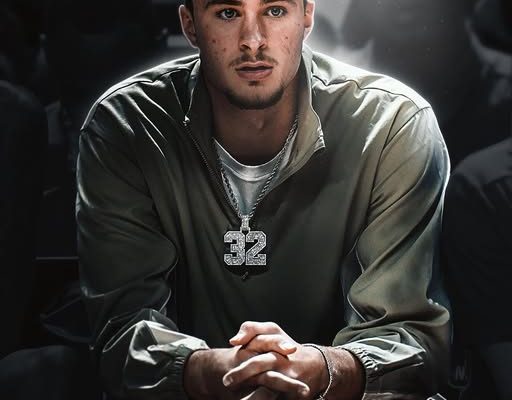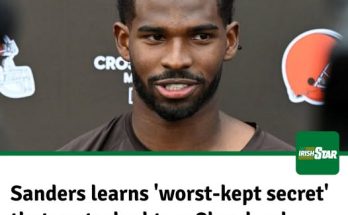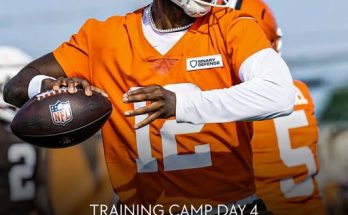In the heart of Las Vegas, where NBA dreams are born, tested, and sometimes shattered under the harsh glare of the Summer League spotlight, one of the most highly touted prospects in years made headlines not just for his on-court performance, but for his mindset. Cooper Flagg, already known for his relentless work ethic and generational talent, did something that left the Dallas Mavericks front office and coaching staff both laughing and marveling at his hunger. After a stellar second Summer League game, Flagg reportedly approached the Mavericks brass and asked to play a third game. The reason? He didn’t want anyone thinking his breakout performance was just a fluke.
This wasn’t just another request from a young player looking for more minutes. This was a declaration of purpose, a mindset of accountability, and a glimpse into what makes Cooper Flagg different. One Mavericks executive described it perfectly: “He shot like crap in his first game here. Second game he dominated. We had a plan to play only two games. Cooper comes to us and the coaches and asks to play a third game. We laughed and told him, ‘No. You’re good.’ And he goes, ‘I just don’t want people to think the good game was a fluke.’ All we could do was laugh, but it shows how much he wants to be great.”
In a league filled with immense talent, what separates the good from the great is not just skill, but the unrelenting desire to improve, to prove, and to dominate consistently. Cooper Flagg already seems to understand that. At just 17 years old, Flagg carries the presence of a seasoned veteran, not just in how he moves on the floor, but in how he carries himself off it. In this era of load management and carefully curated exposure for top prospects, Flagg’s plea to play an extra game for the sole purpose of silencing doubters reveals a rare trait — he cares deeply about his narrative, but even more about the truth behind it.
That first game didn’t go his way. His shot wasn’t falling, his timing was off, and the expectations that come with being arguably the best high school prospect in a generation seemed momentarily too heavy. But instead of retreating, instead of hiding behind excuses or letting public perception slide, Flagg bounced back with force. His second game was a masterclass in adjustment and resilience. He defended with purpose, finished at the rim, made high-IQ plays, and reminded everyone why the hype surrounding him is justified. He could’ve stopped there. He could’ve let the good game be the lasting impression. But that’s not how he operates.
Flagg’s competitiveness has been legendary even before he arrived in Las Vegas. Hailing from Maine, he burst onto the national scene with eye-popping athleticism, rare instincts, and a motor that never stops. At Montverde Academy, he continued to develop, polishing his offensive game while maintaining the same edge that had scouts drooling from the beginning. Still, dominating high school competition and performing in a professional setting are two entirely different challenges. The NBA Summer League is a step into the adult world of basketball. It’s fast, physical, and unforgiving. The lights are brighter, the criticism sharper, and the expectations crushing. Many prospects shrink. Cooper Flagg? He wanted more.
The anecdote about his request to play another game is emblematic of something deeper. It’s not about statistics or highlight reels. It’s about integrity. It’s about a young man who understands the importance of consistency and the grind it takes to become great. Plenty of players have a good game and then coast on it. Flagg saw his stellar second performance not as a victory lap, but as a challenge to sustain that level. To him, greatness isn’t a moment — it’s a pattern.
It also speaks volumes about his character that the Mavericks had to be the ones to stop him from playing. In an age where prospects are often protected from overexposure or overexertion, Flagg’s insistence that he wanted to prove himself more was refreshing. The Mavericks brass didn’t laugh at him because the request was ridiculous. They laughed because it was so unexpected — not many 17-year-olds beg for more work, more pressure, and more chances to put their reputation on the line.
His desire to play also reflects a unique brand of humility. On the surface, it might seem like arrogance — a star player wanting to prove his dominance — but it’s actually quite the opposite. Flagg wasn’t satisfied. He didn’t see one good game as enough to validate his place. He knew that critics, skeptics, and fans would all remember his first outing just as much, if not more. He wanted to silence that noise not with words, but with action.
In a media environment that’s quick to anoint and just as quick to tear down, Flagg’s approach is both savvy and sincere. He understands that narratives are powerful, but performance is king. He isn’t relying on his status as a top prospect to carry him. He wants to earn every inch of respect, one possession at a time. That, more than any stat line, should make Mavericks fans excited about his future.
Even though the Mavericks declined his request, telling him he had done enough, Flagg’s mentality will be what carries him into stardom. The NBA is littered with players who had potential but lacked the internal drive to maximize it. The ones who break through — the Kobes, the Giannises, the Duncans — are the ones who obsess over every detail, who fear complacency more than failure. Flagg’s desire to play a third game wasn’t about putting on a show. It was about proving to himself, to his coaches, and to anyone watching that he’s not a one-night wonder.
Mavericks head coach Jason Kidd and the front office likely left Las Vegas with a lot of confidence in Flagg, not just for his performance, but for his approach. That kind of accountability, that self-awareness, is a coach’s dream. It’s the kind of attribute that can’t be measured in pre-draft evaluations or scouting reports. It’s only revealed in moments like this — when no one’s asking you to do more, but you demand more from yourself anyway.
And for the fans, this only adds another layer to the Cooper Flagg legend. Sure, the highlights are impressive. The blocks, the dunks, the vision — they’re all part of the package. But the story of a kid who wasn’t satisfied with a good game, who wanted one more shot to prove himself — that’s the stuff of legends. It’s the type of attitude that transforms potential into legacy.
Flagg’s journey is just beginning, and there will be many more ups and downs along the way. But this moment in Vegas — this simple, passionate request to play — will stick with those who heard it. It’s a glimpse into the heart of a competitor. Not just someone who wants to be in the NBA, but someone who wants to matter in the NBA. Someone who wants to make sure every good game, every highlight, every win, is backed up by effort, focus, and repeatability.
While many players come into the league with high ceilings, only a few bring the kind of attitude that raises the floor as well. Cooper Flagg doesn’t just have the tools to succeed. He has the mindset to become elite. That request for a third Summer League game may have been denied, but the message was received loud and clear — Cooper Flagg is here, and he’s not just passing through. He wants greatness. And he’s willing to do whatever it takes to prove he deserves it.



